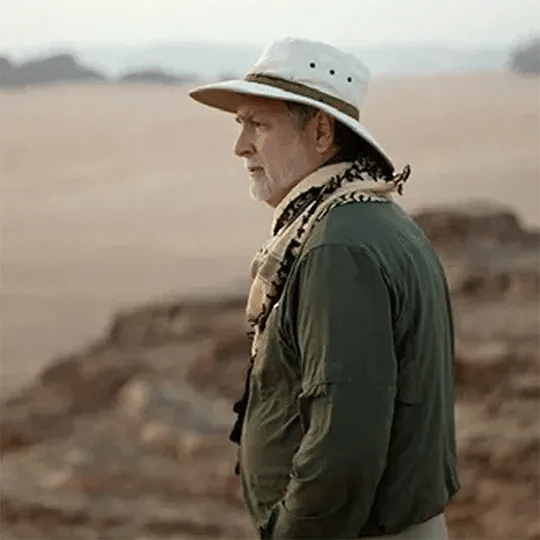The Israel Dilemma — film review
“You don’t lose the right to your home because somebody kicked you out”
So says Israel’s Prime Minister, Benjamin Netanyahu, interviewed in this new investigative film that links Old Testament prophecy with Israel’s modern-day claim for its homeland. In fact, says Netanyahu, the Bible “is Israel’s title to the land”.

Benjamin Netanyahu — interview on The Israel Dilemma
Israel, it seems, has always been engulfed in a cycle of war, interspersed with peace agreements only to end in another war — and it’s all about the land.
This film’s bold claim is that God made an everlasting covenant with Israel and that their turbulent past, going back to King David in 1000 BC, right up to their embattled present, is all prophesied in the Old Testament. It uses high-quality on-location scenes and captivating newsreel, including footage from the founding of the Jewish state of Israel in 1948.
Approach
Christian film-maker Timothy Mahoney’s approach is to start by explaining a Biblical text that prophesies an event. He then introduces historic records from outside the Bible to prove the event happened. Finally, he incorporates recent archaeological finds from ancient civilisations like Assyria, Babylon, and Israel to further confirm the prophecy.
This 3‑pronged approach that weaves together Bible prophecy, non-Biblical literature and archaeology, combined with scholarly commentators, often works well. Let’s take an example.
At the end of the book of 2 Kings we see Israel taken off into exile by Nebuchadnezzar and the Babylonians until, approximately 70 years later, the Persian ruler Cyrus decrees that the Jews may return to their homeland and rebuild the city walls of Jerusalem (as recorded in Nehemiah and Ezra).
Mahoney quotes Isaiah (chapters 41–45) where Isaiah prophecies that Cyrus “the anointed one”, will be chosen by God to return the Jews back to Israel, and he points out that the words of Isaiah predate Cyrus by over a hundred years. This is the Bible prophecy.
He then introduces a historic find called the “Cyrus Cylinder”, a literary artefact discovered in Babylon (Iraq) containing ancient texts that support the notion that the Jews were in exile and were indeed given permission by Cyrus to return home. This is the non-Biblical evidence.
Lastly, the film moves to the excavated evidence of the walls of Jerusalem being rebuilt as the archaeological evidence.
This 3‑way comprehensive approach is repeated for several Old Testament prophecies. In fact, through the film, Mahoney deals with five different types, or layers, of prophecy relating to:
- the kingdom of Israel,
- destruction of the kingdom,
- scattering of the Jews,
- persecution of the Jews,
- the return to the promised land.
Tim Mahoney — film-maker
Chosen-ness
This theme of Israel being God’s chosen nation runs throughout the film. There is much (possibly too much) imagery of a bride (Israel) belonging to her bridegroom (God). Israel and God make a covenant, a binding vow to be faithful to one another. Israel’s repeated infidelity, however, means the promises of the covenant are withdrawn — and there begins Israel’s slide through these five different layers of prophecy.
The film also makes clear, that being chosen is not only a privilege, but can be burdensome. A great deal is expected from Israel in return for being God’s chosen light to the nations. This uneasy balance of privilege and responsibility is nicely summarised by a clip from Fiddler on The Roof, itself a film steeped in Jewish culture:
“I know we’re chosen. But once in while can’t you choose someone else?”
Weaknesses
As with many films that take a strong position on a highly polarising topic, we need to hear from the sceptics. In this film, except for a few, they are absent.
So, for example, the Cyrus Cylinder does support Mahoney’s argument, but it does not actually mention the Jews by name. This isn’t mentioned. Secondly, scholars contest the dating of Isaiah’s prophecy — many believe that Isaiah was written after the events involving Cyrus. This point IS reflected in the film, but the only argument made for the earlier dating of Isaiah — that the literary style of Isaiah fits the earlier date — will not convince everyone.
The film also mentions, on multiple occasions, that Moses authored the first five books of the Old Testament. In an investigative film, you need evidence to defend statements like this.
This is a pity since, if these sceptical voices were better represented, and then countered, the film would be altogether stronger.
However, the most serious criticism is that Palestinian perspectives are barely mentioned. Addressing their historical claim and struggle would have added depth. This exclusion will be unpalatable for many.
Conclusion
Amidst the current upheaval in the Middle East, The Israel Dilemma offers an engaging, if somewhat one-sided, argument tying biblical prophecy to Israel’s claim to its land. It’s a valuable resource for Christians wanting to connect scripture with modern-day events, but its lack of opposing views will alienate some. Having said that, this is only Part 1 of a two-part series, so perhaps there will be more alternative voices in the sequel to The Israel Dilemma.
The Israel Dilemma can be seen on digital download or DVD now
The trailer for the film can be viewed below. Further information can be seen on the film website.
This article was commissioned by Premier Christianity. All Chris’s work for Premier can be found here.
If you enjoyed reading this, try 3 tips to help you read the Bible well
Film trailer:


Hi Chris, I’m writing about your review of The Israel Dilemma that appeared in Premier Christianity. As someone involved in the production of the film, I thought you should know that this film is part of a series of films (the Patterns of Evidence series) and is itself a 2‑part film. We have devoted an entire film of the series (so far) to the topic of Moses’ authorship of the Bible titled Patterns of Evidence: The Moses Controversy. Also, as Part 1 of the Israel Dilemma, the current film’s introduction acts as a hook for both parts 1 & 2… Read more »
Hi Steve Thanks for getting in touch. It’s helpful to know that the film is part of a larger series and that you’ve already addressed Moses’ authorship of the Pentateuch in an earlier film (The Moses Controversy). I understand how the cumulative impact of the series will give a fuller picture, but I think each film also needs to stand on its own, especially given the time gaps between releases. Once the entire series is complete, I’m sure it will be easier to appreciate the overarching narrative. And, yes, I understand the modern Israeli Palestinian dispute is not a discussion point… Read more »
For a Palestinian perspective, I would recommend you try to contact Yohanna Katanocho, a Palestinian-Israeli Evangelical Christian who is p/t visitng lecturer at Regents’ College, Oxford and Dean of Nazareth Bible College, who has authored a number of books including ‘The Land of Christ — a Palestinian cry’. I think this book offers a really credible Biblical response to the Jewish conviction that they are the chosen people and should have sway over what happens in Palestine-Israel. I also heard this man speak about his experiences as a Palestinian in occupied territory and it was chilling. Having said all that,… Read more »
I haven’t watched this film but sadly, there were two glaring omissions in the review for me. 1. Jesus. Any discussion of biblical Israel and prophecy about Israel and land, covenant, and promise and people, from a Christian film-maker or reviewer is meaningless without reference to Jesus Messiah. 2. The oldest Christian community in the world, and the biblical scholarship and theology that come from them — the Palestinian church, prophesied in the Hebrew sscriptures, prepared for their global witness by Jesus, who lived and still live the reality of the “barrier wall of separation” coming down in Jesus, and the… Read more »